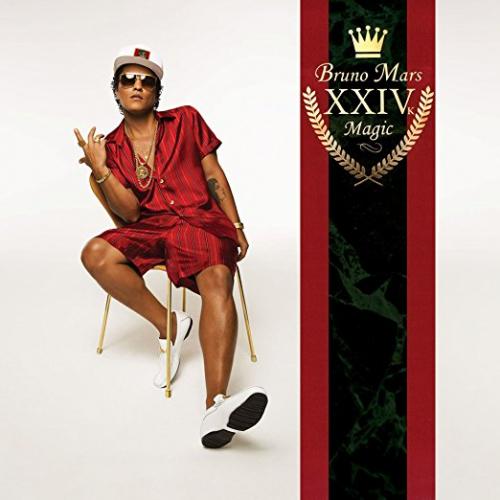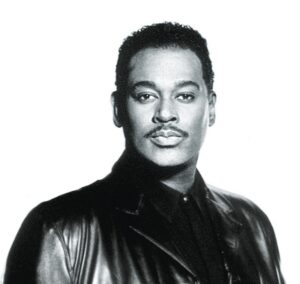Bruno Mars – 24k Magic
24K Magic, the third studio album from the multi-talented Bruno Mars, is without question the fiery vocalist’s most straightforwardly R&B- and funk-geared set yet. Thus, even with the massive superstardom he’s attained since wooing over pop audiences in 2010 via “Just the Way You Are,” it’s appealing that he’s used his elevated status to give a no-holds-barred appreciation to the 1980s west coast G-funk swagg of luminaries like Zapp, as well as odes to ‘90s new jack swing and James Brown-inspired ‘70s flavor. The global explosion of his 2014 collaboration with Mark Ronson, “Uptown Funk,” undoubtedly served as impetus for the stylistic direction of this effort (which he explored earlier on 2012’s “Treasure”), and the short and sweet presentation (nine songs, clocking in at just over half an hour) is refreshing in an age when most artists feel compelled to fill a CD with at least 13 or 14 tracks.
While the musical mindset of 24K Magic is decidedly vintage, the lyrical landscape is largely contemporary. This sometimes translates to gimmicky passages and slightly obnoxious overtones (most notably on the title track), but it’s generally not so distracting as to take away from the sheer feel-good stance of the album. Split almost evenly between dance-your-butt-off jams and mood-setting slow grooves, melodic atmosphere and rhythmic construction are the key components here—alongside, of course, Mars’ strikingly elastic delivery…at times, roof-raising; at others, glisteningly romantic. His focus on rapping is a bit too much for his own good on the title track; but in the majority of instances, listeners are reminded once again that he is one of the few singer’s singers to scale widespread commercial heights in this era.
Whether it’s the eagerness he conveys with supple energy on the pleasingly funky “Finesse,” the passionate conviction of his longing on “Too Good to Say Goodbye,” or the vulnerable sensibility he injects into “Versace on the Floor,” there’s a solid foundation to both his note range and understanding of effective phrasing throughout. These tunes also happen to be among the strongest on 24K Magic, though it’s likely that flashier entries in the mode of “Uptown Funk” (such as “That’s What I Like” and the aforementioned “Perm”) are likely to get more mainstream attention. The snaky groove and sinuous hook of “Chunky” mark an ideal balance between the showy and subtle aspects of Mars’ attractiveness. The beat is lively enough to draw in casual listeners, while his vocal elocution is coolly confident and the lyrics playful and carefree without going over the top.
The standout of the album is “Calling All My Lovelies,” an atmospheric midtempo gem on which Mars is at once deftly relaxed and chic. The seamless building of the chill verses into a desirous bridge works perfectly with the spine-tingling production of Jeff Bhasker and Emile Haynie, who join forces with primary album producers Shampoo Press & Curl to unearth an unadulterated mid-‘80s time capsule. (Halle Berry’s spoken cameo doesn’t hurt, either.) In contrast, the early-‘90s throwback “Straight Up & Down” (built on a sample of Shai’s hit “Baby I’m Yours”) is the only case on 24K Magic in which lyrical laziness gets in the way of a good tune: “This liquor got both of us faded, so gone…but your booty deserve a celebration, and I’m gonna celebrate it all night long.” Along with the annoying inflection with which the hook is sung, this cheap-sounding rhetoric spoils what would otherwise be an enjoyable listen.
As for “Perm,” the arrangement’s driving drums, shrewd guitar licks, and horn punctuations form a dynamic engine for Mars’ fully engaged and engaging dispatch of irresistibly motivating phrases—shouted in the style of Soul Brother Number One. “There’s that smile I’m lookin for, was that so hard…If you ever need a smile again, girl, take my card”—it’s hard not to get caught up in his compelling exertion, which he continues in the breakdown (“You need to activate your sexy/Silky, smooth, and snap”).
24K Magic manages the complex feat of luring in listeners with something familiar, but ultimately expanding upon that link with a variety of tools that allow Mars to branch out from where he’s gone before. The only thing that stops him from fully taking things to the next level is the inconsistent caliber of lyrics—which some fans may consider a significant letdown. But if one is able to put that misguided commercial calculation aside, there are plentiful helpings of compositional quality, top-level vocals, and entertaining musical elements to savor. Recommended.










